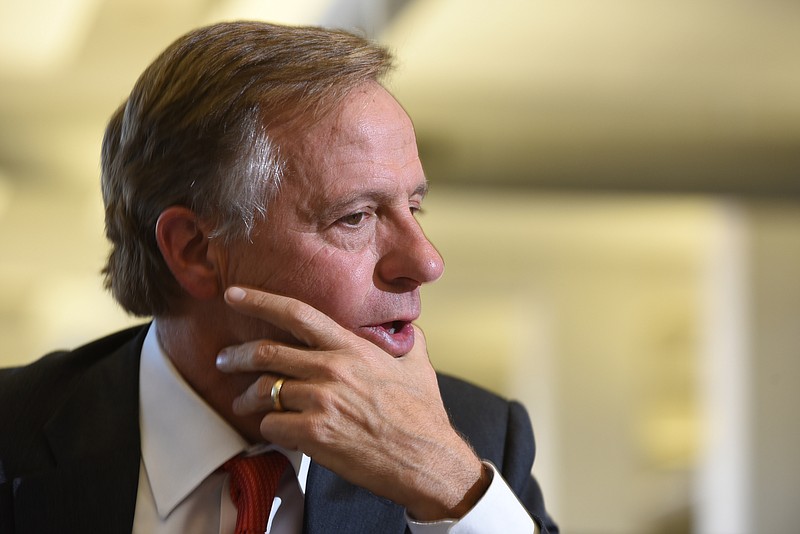NASHVILLE - Gov. Bill Haslam says efforts by EPB and other municipal electric services to expand high-speed Internet to rural areas won't fully solve Tennessee's broadband accessibility issues and doesn't fairly treat for-profit servers like AT&T and Comcast.
"The easy thing everybody can say is, 'We need broadband,'" the Republican governor told Times Free Press editors and reporters last week. "The difficult thing is to say, 'How are we going to do it?' I mean, one of the current bills won't really do that. It'll provide broadband to some additional areas but it really won't take it to everyone, anywhere."
Proposed legislation would lift restrictions on where municipal utilities such as EPB can offer services. Chattanooga's EPB has said the city-owned utility is eager to offer its fiber-optic telecom services throughout Bradley County.
The municipal broadband bill, sponsored in the House by Rep. Kevin Brooks, R-Cleveland, would allow EPB and other public utilities to expand into areas served by rural electric cooperatives if the co-ops agree. But for-profit companies oppose the legislation.
As proponents of the years-long effort to expand municipal broadband began cranking up another attempt this year, Randy Boyd, Haslam's commissioner of economic and community development, announced he was launching a statewide assessment of broadband access and usage in Tennessee.
That prompted House Speaker Beth Harwell, R-Nashville, to say the bill would likely be postponed a year.
Haslam said Boyd will determine what parts of the state do not have broadband and how many people are without the service.
The governor said his own "best read of the numbers" is there are 200,000 households that don't have broadband.
Sen. Janice Bowling, R-Tullahoma, sponsor of the upper chamber's broadband bill, took issue with a number of the governor's statements. The 200,000 estimate is "totally bogus" and too low, she said, adding she's heard that estimate previously "from people who stand to profit by saying it's that low."
"The truth is there are hundreds of thousands, more than 200,000," she said. "There's a significant number of homes that have no access and an equally significant number of homes that have no competition, no choice and something that is unreliable, unaffordable and that's not their product choice."
The municipal broadband expansion bill "is taking 'trouble' off of the plate" of companies, Bowling said. "Their corporate model says that they can't provide to people unless it's in a more densely populated area. We do not quarrel with their model and we appreciate them going where they will go.
"However," she added, "Tennessee can no longer be held hostage to their corporate model. There will be multiple solutions, but they've got to include competition and choice."
The Tennessee Municipal Election Power Association in a statement said, "With over 422,000 households across Tennessee without broadband, there will never be a silver bullet solution to getting everyone access."
"Municipal broadband is just one solution to help get broadband to several thousand households that doesn't spend a dime of tax dollars and allows local utilities and communities to make the investment themselves," said the group, whose members include EPB. "Parents, students and businesses without broadband should not have to keep waiting year after year for the state to figure out the perfect solution when there is at least one very good one whose time has come."
Rep. Dan Howell, R-Georgetown, said that while he respects and works well with Haslam on issues from education to rural development, "We are far apart on the issue of broadband."
Last week, Howell told attendees at a broadband rally in the state Capitol that access to fast Internet was the No. 1 issue in his largely rural Bradley County district.
"I believe [House Bill 1303] will break the monopoly of the big telecoms that have held the rural residents of Tennessee hostage for two decades or more," Howell said. "Approximately 30 other states see the benefit of competition in the broadband industry and have allowed the market and consumer to decide who will be their provider."
To Haslam's claim the bill isn't fair to commercial providers, Howell said, "I believe it's unfair that AT&T of Tennessee received $156 million in federal subsidies in September 2015 to provide broadband to the rural areas of Tennessee, while using their deep pockets and 14 lobbyists to kill HB 1303 and, as a result, any competition to their and the other big telecoms' monopoly."
He was referring to money from the Federal Communication Commission's Connect America Fund for to expand broadband in Tennessee.
However, AT&T spokesman Daniel Hayes said the two aren't the same.
"It is incorrect to equate the common practice of government providing incentives to encourage private-sector behavior with the concept of direct government competition," he said.
He said the FCC fund's private-sector incentives are "specifically designed to encourage deployment to address a clearly defined and limited federal goal."
"Generating significant amounts of public debt to sustain municipal networks is a different animal," Hayes added. "Taxpayer money should not be used to over-build or compete with the private sector, which has a proven history of funding, building, operating and upgrading broadband networks."
Tennessee municipal electric services drew national attention last year when the FCC voted 3-2 to overrule state restrictions on municipal electricity providers. The federal agency decreed EPB and a municipal utility in Wilson, N.C., could expand their service territories to meet the congressional mandate to expand broadband service.
Tennessee Attorney General Herbert Slatery, Haslam's former general counsel, appealed the FCC decision to a federal appellate court, and EPB says it won't move ahead on any expansion until the court has clearly ruled it is permissible or state law is changed.
Contact Andy Sher at asher@timesfreepress.com, 615-255-0550 or follow via twitter at AndySher1.
